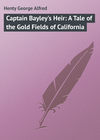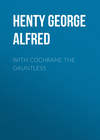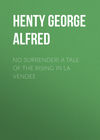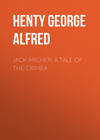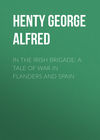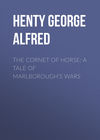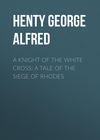Buch lesen: «Captain Bayley's Heir: A Tale of the Gold Fields of California», Seite 22
CHAPTER XXII.
CLEARED AT LAST
THE following day, after lunch, Captain Bayley and Frank drove round to Westminster. Football was going on in Dean's Yard, and Frank recognised among the players many faces that he knew. It seemed strange to him to think that while he had gone through so much, and had grown from a boy into a man, that they had changed so little, and had been working away regularly at the old round of Euripides and Homer, Terence and Virgil. The carriage stopped at the entrance to Dean's Yard, and, alighting, they walked across to Mr. Richards'.
Captain Bayley had written a line to the master, asking him if possible to remain at home, as he wished particularly to see him, and he and Frank were ushered straight into the master's study. He shook hands with Captain Bayley, whose acquaintance he had made while Frank had boarded with him, and then looked at Frank; for a minute he did not recognise him, then he exclaimed in surprise, "Frank Norris!"
"Yes, it's I, sir," Frank said; "I don't ask you to take my hand, for you believe me guilty of the crime of which I was accused here. I can only say now, as I said then, that I am innocent. I know now that I was a fool to run away instead of facing it out, but I was desperate, because every one thought me guilty."
"Your schoolfellows did not, Norris," Mr. Richards said. "I don't think that I did, even at first; a few hours afterwards I almost knew you were innocent, and had you not run away I could have gone far to prove it."
Frank gave an exclamation of joy, and Captain Bayley exclaimed indignantly —
"Then why did you not prove it, sir? Why did you allow my nephew to remain with the foul disgrace on his name?"
"I did not act without consideration," Mr. Richards said calmly. "Norris had gone, and I resolved if he returned again to say what I had learned; but my proofs were not absolute. We had made, it seemed to me, a terrible mistake, and I did not wish to cause ruin to another boy unless it was absolutely necessary to do so to clear Norris. Now that he has returned I can no longer hesitate; but before I begin I must ask you both whether your suspicions have fallen on any one else?"
"It is not suspicion, sir, it is certainty," Captain Bayley said; "we have no doubt whatever that the whole thing was the work of Frank's rascally cousin, Fred Barkley. He was, you know, a sort of rival of Frank for my favour, and he had reason to believe that I had determined that Frank should inherit the larger portion of my property; thus he had a motive for bringing disgrace on him. It was just as probable that he should have stolen the money and sent it to Frank as that Frank should have stolen it himself; so far it seemed to me that it might lie between either of them.
"What has settled the case in my mind is that I have learned that Fred was intrusted with a letter by Frank to me, declaring his innocence, which, as you know, I never doubted until Frank left without writing to me. That letter I never received, and I believe that it was suppressed. In the second place it was Fred who persuaded his cousin to take that ruinous step of running away, and pressed upon him money to enable him to do so, although he had refused to lend him a halfpenny when Frank required it to pay that broken-nosed tailor to hold his tongue."
"Very well," Mr. Richards said, "then I can speak freely; my silence was caused to some considerable extent by regard for your feelings. You had lost one nephew, who had gone away with a cloud of disgrace surrounding him – for aught I could tell, Norris, in his despair, might have committed suicide, or he might have so cut himself off from you that you might never have heard from him again – thus, then, I felt that it would be cruel indeed to prove that your other nephew was a villain, unless by so doing I could restore Norris to you. So, after much thought and deliberation, I determined to hold my tongue until I heard that Norris had either returned or had been heard of.
"On the morning when it was discovered that Frank had fled, I called up one by one the whole of the boys in the house. Even after his flight I could not believe that Norris had done this thing, it was so absolutely contrary to all that I knew of his disposition, and I determined to sift the matter to the bottom. From the elder boys I learned nothing, although I questioned them most closely as to everything that had taken place in the house during the past week. I was not disappointed, for I had hardly expected to learn much from them.
"It was from the four boys who were the fags of the four who had been in Frank's secret that I hoped to learn something, and I was not mistaken. From the three in the house I learned nothing; but when I came to Pearson, who was Barkley's junior and fag, I met with even more success than I had expected. At first, of course, the boy did not like to say anything; but I told him that unless he answered my questions freely I should have him up before Doctor Litter, and he then told me all he knew about it.
"The more willingly, for, like most other boys in the School, he was fond of Norris, while Barkley was by no means a kind master. He said that twice Barkley had got into a rage with him about things which didn't seem of any importance. The first occasion was a week previous. He had gone into Barkley's study to ask him to explain some difficulty in his Cæsar; the door was not fastened, and as he had been working with his shoes off, Barkley did not hear him till he was close to the table. The boy noticed that he had a sheet of writing-paper before him, on which he was writing, not in his usual hand, but in printed characters. He would have thought nothing of it had not Barkley, on looking up and seeing him standing there, jumped up in a sudden rage and boxed his ears furiously, calling him a prying little sneak. The boy could not fix this to a day, but it was certainly just about the time when this letter was posted to you.
"The other affair had happened the day previously. He had gone into Barkley's room with his books on coming down from school at twelve o'clock, and seeing on his table a letter stamped and ready for the post, he supposed that as usual he was to post it, and was running downstairs with it in his hand when he met Barkley coming up. 'What have you got there?' he asked. 'I am taking your letter to the post,' he said; whereupon Barkley flew into another rage, called him an officious little beast, gave him a box in the ear, and took the letter from him. I asked the boy if he noticed to whom the letter was directed. He said he had, and that it was to you. Knowing nothing about the suppression of a letter of Norris's, and thinking that perhaps Barkley had written to his uncle about the matter, and had then changed his mind about posting it, this second affair did not strike me as having any importance whatever. The first matter, however, seemed important, for that just at the time when a letter was sent to Norris written in printing characters Barkley should have been seen writing a letter of that sort, struck me as most remarkable; and although I did not know exactly how the two lads stood in reference to yourself, it struck me at once that it was at least possible that we had been wrong, and that it was Barkley after all who took the note.
"Had I suspected for an instant that he had done it to bring disgrace upon his cousin, I should at once have communicated with Dr. Litter, and have probed the affair from the bottom; but I thought that he had taken the note with the intention of helping his cousin out of his difficulty, and that when the note was traced, and the matter became public, he had in a base and cowardly manner allowed Frank to bear the blame. This would have been bad enough in all conscience, although comparatively venial to his deliberate attempt to bring disgrace upon Norris.
"However, the matter seemed bad enough to me as it stood; but, as I said, I shrunk from causing the ruin of another young fellow unless it was necessary to clear Norris. I hesitated for a long time whether, knowing as much as I did, I ought not to take some steps in the matter; but for the reasons I have told you I determined to wait, hoping that you would soon have Norris back again, and knowing that I should hear of his return from some of the boys who were his special friends. Barkley must have seen from my manner that there was something wrong between him and me; but he never asked me the reason for the change in my manner to him, and completely ignored my coolness. It was a relief to me when the time came for his going up to the University, for I then felt that some of the responsibility was off my shoulders, and that I was no longer shirking my duty to expose him.
"That is all, Captain Bayley; but I think that this, with what you have told me, is quite sufficient to bring the guilt home to the true party, and to completely clear Norris."
"Quite sufficient," Captain Bayley said, "and I am thankful indeed that you obtained the one missing link of evidence necessary to prove Frank's innocence. I am greatly obliged to you, Mr. Richards, for the kind and thoughtful manner in which you acted, which was indeed in every way for the best; for had I at the time been made aware that Fred was the culprit, I should have gone half out of my mind at the injustice we had done Frank, and at not knowing where to find him or how to communicate with him. And now what is to be done next? I do not want this unhappy lad to be punished, but at the same time it is absolutely necessary that Frank's innocence shall be publicly proclaimed. Fred will no doubt brazen it out."
There was silence for a minute or two, and then Mr. Richards said.
"If you like, Captain Bayley, I will take the matter in hand. I will write to Barkley and tell him that Norris has now come home, and that I must therefore take up the matter at the point at which I dropped it. I will recapitulate to him the reasons that there are for supposing that he stole the money, – first, his interest in Frank's disgrace; secondly, the fact that he was seen writing a letter in printed characters on the day on which the note was sent to Norris; thirdly, his suppression of the letter to yourself; fourthly, the part he took in persuading Norris to run away; lastly, the hints which you say he gave you that Norris had confessed his guilt.
"I shall tell him I have had this interview with you; that you are thoroughly convinced of his guilt and of Norris's innocence; and that while you are determined that Norris shall be vindicated, you are desirous that his act of treacherous villainy shall not be made public; if, then, he will write a confession, saying that he took it, this confession shall not be made public.
"I shall of course show it to the Doctor, and explain the whole circumstances to him, and ask him to make a public statement in school to the boys, to the effect that it has been found out that Norris was not guilty of the act of which two years ago he was charged, and that the real thief has been discovered, but that as he is no longer at school it is unnecessary now to mention his name, and that, moreover, he has been heavily punished for the crime – which indeed is the case – by his loss of your favour and of the fortune which he looked to obtain under your will.
"I shall tell Barkley that if he refuses to confess it will be necessary, in order to clear Norris, that the affair should be investigated in a Public Court, and that Dr. Litter will at once apply for a warrant for his apprehension on the charge of theft, and that the whole matter will then be gone into in a Police Court. I cannot doubt but that he will accept the first alternative, for the second will be ruin to him."
Captain Bayley cordially assented. Three days later Frank received a letter from Dr. Litter asking him to call upon him.
"I am truly sorry, Norris," the head-master said, as he entered, "for the injustice I did you; truly and heartily sorry. The affair caused me intense pain at the time; it has been on my mind ever since. Over and over again something has told me that you were innocent; and yet, thinking the case over again, my reason has always convinced me for the time of your guilt, for I could see no other possible solution of the mystery. I am glad indeed to find that I was mistaken, and that you were a victim of a piece of what I can only term villainy. The affair will be a lesson to me for my life, and henceforth I will never allow appearances, however apparently conclusive, to weigh against a uniformly excellent character. I trust that you will forgive my terrible error."
"I don't see that you could have acted otherwise, sir," Frank said, "for even at the time, although I knew that I was innocent, I perceived that the proofs against me were so overwhelmingly strong that my guilt must appear a certainty to every one. I am happy indeed that I am cleared at last; and, after all, it has done me no harm. I have, of course, lost the University education which I looked forward to; but I think, after all, that the three years I have spent in America have in many ways done me more good than the University could have done."
"Very likely, Norris," the doctor said; "they have in every sense of the word made a man of you, and a very fine man too, and I sincerely trust that no further cloud will ever fall upon your career. And now I want you to come up School with me, for I must publicly make amends for my error, and set you right before the School."
As Frank followed Dr. Litter into the great schoolroom he felt infinitely more nervous than he had done in any of the dangers he had passed through in his journey across the plains. When the head-master was seen to enter the School accompanied by a gentleman, a silence of surprise fell upon the boys, for such an event was altogether unprecedented there. As in the stranger, who stood nearly as tall and far broader than the doctor, many of the boys in the upper forms recognised Frank Norris, a buzz ran round the School, followed again by the silence of excited expectation. Dr. Litter walked to his table at the further end of the School and then turned.
"You will all stand up," he said. "Boys," he went on, "all of you in the Fifth Form, and those above it, and some of you in the under forms, will recognise in the gentleman who stands beside me your former schoolfellow Norris; those who do will be aware of the circumstances under which he left, and will be aware that I charged him with stealing a note of the value of ten pounds from my desk. I am happy to say that it has been proved that charge was entirely false."
A sudden burst of enthusiastic cheering broke from the upper forms. Norris's innocence had been a matter of faith among his schoolfellows, and even his running away had not sufficed to shake their trust in him. They stood upon the forms and cheered until they were hoarse. At last a wave of the doctor's hand restored silence, and he went on.
"I wish now, before you all, boys, to express my deep regret to Norris, and to apologise to him most heartily for the accusation which I made. I have now in my hand the confession of the real culprit. I shall not mention his name; he has long since ceased to be among you, and I may say that he has been punished severely, though to my mind most insufficiently, for his crime, and as Norris is desirous that the matter shall be dropped, the least I can do is to give in to his wishes. And now, as I think that after this you will scarcely do any useful work this afternoon, you may as well go down at once."
A fresh roar of cheering broke out, and then the boys who had been at school with Frank jumped from their forms and crowded round him, each striving to grasp his hand, and all shouting words of welcome and congratulation.
It was some time before Frank could reply to these greetings, so shaken was he by the scene. On emerging from the schoolroom his old house-mates urged him to go up to Richards', and the Sixth were invited to accompany him. Although contrary to the usual rules, an unlimited supply of shandy-gaff was sent for, and for an hour Frank sat and chatted with his old schoolfellows, and to their great admiration gave them an outline of his adventures on the Mississippi, his journey across the plains, and as a gold-digger in California; then with a glad heart, and a feeling that he was at last cleared of the cloud which had so long hung over him, Frank returned to Eaton Square.
His path in life never afterwards crossed that of his cousin. The latter, after passing through the University with credit, entered the Bar. Somehow he was not successful there. That he was clever all allowed, but a cloud seemed to hang over him. The tale of Frank's reinstallation had gone up from Westminster to the University; his old schoolfellows there had talked the matter over, and although nothing was known for certain, somehow the belief that Barkley was the culprit spread among them.
He had never been popular, and now his old schoolfellows gradually drew aloof from him. Nothing was ever openly said. The thing was talked of in whispers, but even whispers, sometimes, are heard; and during his last year at the University Fred Barkley stood alone among his fellows. The whispers found their echo in town, and Fred Barkley found that a cloud rested on him which all his efforts were unable to dissipate. After some years of useless attempts to make his way, he was glad to accept the offer of a petty judgeship in India, and there, ten years later, he died, stabbed to the heart by a Mahomedan dacoit whom he had sentenced to a term of imprisonment.
A year after his return from America Frank married Alice. Turk, for some time after his arrival in England, had steadily declined all advances which she made to him, perceiving clearly in his heart that she was a rival in his master's affection. He had at last, however, the good sense to accept the situation; but to the end of his life, which was a long one, he never accorded her more than toleration, keeping all the affection of his great heart for his master, although in his old years he took to his master's children, and endured patiently, if not cordially, the affection which they bestowed upon him.
Frank sits in Parliament at present, as member for the county in which the broad estates which came to him with his wife are situated. It was rather a disappointment to her that he did not distinguish himself greatly in Parliament, but he was fonder of the country life of an English gentleman than of the squabbles at Westminster. He can always be depended upon to vote with his party, and he occasionally makes vigorous and indignant attacks against any policy which he believes to be lowering the prestige and position of his country; but, except upon occasions when subjects of national interest are being discussed, he is seldom to be found in the house, and his wife is now well content with his reputation as one of the best masters of fox-hounds, one of the best landlords, and one of the most popular country gentlemen in England.
Captain Bayley died but ten years ago, at a great age, and his grandson, long since able to dispense with his crutches, is one of the most prominent members in the House of Commons. He could, had he chosen, have long since had a place in the Ministry, but he declined, as it would have taken too much of his time from the favourite subject which occupies the chief part of his thoughts and life, namely the effort to ameliorate the condition of the poorer classes in the great towns.
Evan Holl is a distinguished engineer. The business of John Holl, Dust Contractor, is still carried on under that name by the children of John and Sarah, who died within a few days of each other, some twenty years since, full of happiness and contentment.
